5 Music Reviews
by dave heaton
Boyracer, Happenstance (Happy Happy Birthday to Me Records)
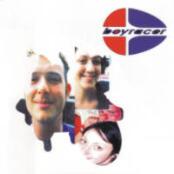 Boyracer's punk (in manner and attitude, not style) approach to catchy, melodic pop is as fresh on their new album Happenstance as it ever was. The Boyracer discography is deep, but their recent releases, like their great last album To Get a Better Hold You've Got To Loosen Yr Grip, have sounded particularly streamlined and energetic. Happenstance is no exception - from the opening razor-sharp guitar riffs that turn into clouds of fuzz, through to the typically feedback-soaked ending. 'Anyone can pick up a guitar and play' is their ethos, yet Stewart Anderson, who stands at the center of Boyracer, has a supreme gift at melody to match his ragged individualism. He has an awkwardly beautiful singing voice, matched nicely in places with backing vocals from the band's other central member Jen Turrell. Every super-catchy song holds within its tune a heart and a sincere rebelliousness - Boyracer's both bitter and hopeful, pissed-off and romantic. The songs are smothered in brillant feedback much of the time, though here and there the noise vanishes to spotlight how pretty the melodies and words can be ("The Moment" is a gem), or things slow down with gentle piano. 23 songs in 37 minutes is how they do it. "Don't lose your ideals!", they proclaim in one song, and I'm glad they haven't. Happenstance is right up there with their most consistent records, pretty and punk through and through.
Boyracer's punk (in manner and attitude, not style) approach to catchy, melodic pop is as fresh on their new album Happenstance as it ever was. The Boyracer discography is deep, but their recent releases, like their great last album To Get a Better Hold You've Got To Loosen Yr Grip, have sounded particularly streamlined and energetic. Happenstance is no exception - from the opening razor-sharp guitar riffs that turn into clouds of fuzz, through to the typically feedback-soaked ending. 'Anyone can pick up a guitar and play' is their ethos, yet Stewart Anderson, who stands at the center of Boyracer, has a supreme gift at melody to match his ragged individualism. He has an awkwardly beautiful singing voice, matched nicely in places with backing vocals from the band's other central member Jen Turrell. Every super-catchy song holds within its tune a heart and a sincere rebelliousness - Boyracer's both bitter and hopeful, pissed-off and romantic. The songs are smothered in brillant feedback much of the time, though here and there the noise vanishes to spotlight how pretty the melodies and words can be ("The Moment" is a gem), or things slow down with gentle piano. 23 songs in 37 minutes is how they do it. "Don't lose your ideals!", they proclaim in one song, and I'm glad they haven't. Happenstance is right up there with their most consistent records, pretty and punk through and through.
Entrance, Wandering Stranger (Fat Possum) A Houseguest's Wish: Translations of Wire's 'Outdoor Miner' (Words on Music) Postal Blue, International Breeze (Shelflife) The Visitations, Propaganda (self-released)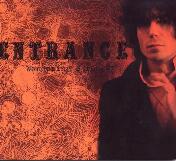 Entrance singer Guy Blakeslee's switch from the common blues image "the train is coming/better get on board" to "the truth is coming" partway through the first song on Wandering Stranger is telling. This is someone who sees the blues as the truth, as the exemplification of what's real and honest in the world. You can hear his belief in the blues as a saving power in his wailing voice - which has a traditional blues feeling about it but just as often reminds one of rock n' roll blues lovers like Jim Morrisson. You can hear it in his guitar, whether he's strumming or letting it explode. And you can hear it in his songs; when he isn't rewriting traditional blues songs, he might as well be. The cover of Townes Van Zandt's "Rex's Blues" seems appropriate too, given how raw and American the song is, though Entrance's delivery of it comes nowhere near capturing the grave beauty inherent in Townes' own singing of it. And therein lies the quandry with Wandering Stranger; even though most of these songs are originals, they're so similar in tone, style, sound and melody to old classic blues songs that it makes me wonder why someone would prefer this recording to those. I feel like I've only begun to step into the vast terrain that is early blues music. Wandering Stranger just makes me want to further my investigation of the music that he's mimicing. If I had run out of old blues to listen to, then I'd understand spending a lot of time with Wandering Stranger. But to me Entrance is adding little new to the story, so why should I bother? He performs with passion, has a complete understanding of the blues and is skilled at playing the blues, but his songs feel like shadows of songs from the past, songs that are still here for us to listen to. Then again, who knows? Maybe it takes a fresh face to show people that music is still alive no matter when it was recorded.
Entrance singer Guy Blakeslee's switch from the common blues image "the train is coming/better get on board" to "the truth is coming" partway through the first song on Wandering Stranger is telling. This is someone who sees the blues as the truth, as the exemplification of what's real and honest in the world. You can hear his belief in the blues as a saving power in his wailing voice - which has a traditional blues feeling about it but just as often reminds one of rock n' roll blues lovers like Jim Morrisson. You can hear it in his guitar, whether he's strumming or letting it explode. And you can hear it in his songs; when he isn't rewriting traditional blues songs, he might as well be. The cover of Townes Van Zandt's "Rex's Blues" seems appropriate too, given how raw and American the song is, though Entrance's delivery of it comes nowhere near capturing the grave beauty inherent in Townes' own singing of it. And therein lies the quandry with Wandering Stranger; even though most of these songs are originals, they're so similar in tone, style, sound and melody to old classic blues songs that it makes me wonder why someone would prefer this recording to those. I feel like I've only begun to step into the vast terrain that is early blues music. Wandering Stranger just makes me want to further my investigation of the music that he's mimicing. If I had run out of old blues to listen to, then I'd understand spending a lot of time with Wandering Stranger. But to me Entrance is adding little new to the story, so why should I bother? He performs with passion, has a complete understanding of the blues and is skilled at playing the blues, but his songs feel like shadows of songs from the past, songs that are still here for us to listen to. Then again, who knows? Maybe it takes a fresh face to show people that music is still alive no matter when it was recorded.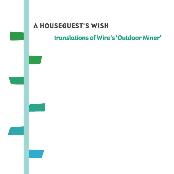 For some reason, CD singles with five versions of the same song get old in a heartbeat, yet I can listen through close to half of A Houseguest's Wish: Translations of Wire's 'Outdoor Miner' without even realizing that I'm listening to the same song again and again. Maybe that has to do with the strength of the original song, how mysterious it is. But I think it's mostly a testament to this compilation, and to the diversity of approaches the musicians take to the song. A Houseguest's Wish collects 19 versions of "Outdoor Miner," from Wire's 1978 album Chairs Missing. By the album's end, the song has been drilled into your head, but you've heard it done in so many styles that you're aren't sick of it. A Houseguest's Wish opens with a lovely stripped-down folk-singer version by Adam Franklin. That's followed by a dreamy pop version by Titania which highlights the uplift of the melody. Then there's Carlos Forster (ex-For Stars) singing it over synth in a high voice filled with loneliness and joy. And so on...each version is different from the one before, and most of them are truly captivating and unique. It takes until over halfway through before there's a version that goes anywhere near trying to mimic Wire's original in terms of style. A couple of these have been released before - obviously, those from defunct bands Lush and Flying Saucer Attack have been - but most have not. Some of my favorites renditions push the song further in a pop direction without dumbing the song down, like the interpretations by UK dream-mongers Fiel Garvie and Californian indie-pop singer Laura Watling. There's also a slow take on it by Above the Orange Trees which is quite affecting, a lonely blues cover by Christian Kiefer, and much more. To what end 19 versions of the same song? A Houseguest's Wish is a grand celebration of Wire's songwriting capabilities and these artists' interpretative powers. Most importantly it succeeds at illustrating the song's versatility, how powerful it can be in so many different settings.
For some reason, CD singles with five versions of the same song get old in a heartbeat, yet I can listen through close to half of A Houseguest's Wish: Translations of Wire's 'Outdoor Miner' without even realizing that I'm listening to the same song again and again. Maybe that has to do with the strength of the original song, how mysterious it is. But I think it's mostly a testament to this compilation, and to the diversity of approaches the musicians take to the song. A Houseguest's Wish collects 19 versions of "Outdoor Miner," from Wire's 1978 album Chairs Missing. By the album's end, the song has been drilled into your head, but you've heard it done in so many styles that you're aren't sick of it. A Houseguest's Wish opens with a lovely stripped-down folk-singer version by Adam Franklin. That's followed by a dreamy pop version by Titania which highlights the uplift of the melody. Then there's Carlos Forster (ex-For Stars) singing it over synth in a high voice filled with loneliness and joy. And so on...each version is different from the one before, and most of them are truly captivating and unique. It takes until over halfway through before there's a version that goes anywhere near trying to mimic Wire's original in terms of style. A couple of these have been released before - obviously, those from defunct bands Lush and Flying Saucer Attack have been - but most have not. Some of my favorites renditions push the song further in a pop direction without dumbing the song down, like the interpretations by UK dream-mongers Fiel Garvie and Californian indie-pop singer Laura Watling. There's also a slow take on it by Above the Orange Trees which is quite affecting, a lonely blues cover by Christian Kiefer, and much more. To what end 19 versions of the same song? A Houseguest's Wish is a grand celebration of Wire's songwriting capabilities and these artists' interpretative powers. Most importantly it succeeds at illustrating the song's versatility, how powerful it can be in so many different settings.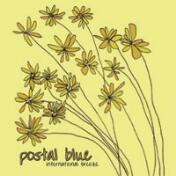 To me Postal Blue are a sound more than anything else. By that I don't mean that they lack songwriting abilities. Rather, this Brazilian duo's songs are filled with pretty melodies that do stand out from the crowd. Yet I can rarely remember any of the specific songs on their debut album International Breeze; instead what I remember is a feeling. The album feels like a tropical breeze and like a melancholy, rainy day at the same time...and feeling is what I get from Postal Blue, what I picture when I think about their music after the fact. The 11 songs on International Breeze bounce along in a light pop way, while singer Adriano Ribeiro sings in a sensitive, serious, often sad way that sometimes reminds me of a less-dramatic, kinder Smiths. The melodies float along, occasionally piercing into my brain, yet I feel like they won't really plant themselves in my brain until I've listened a dozen more times. In that way Postal Blue are the epitome of low-key. There's nothing about them that lunges at you, you have to come to them...and lean in closely to really hear what they're saying and playing. But the overall impression of their sound, its overall loveliness combined with a genuinely sad mood, remains strongly with you after the album's 40 minutes are over.
To me Postal Blue are a sound more than anything else. By that I don't mean that they lack songwriting abilities. Rather, this Brazilian duo's songs are filled with pretty melodies that do stand out from the crowd. Yet I can rarely remember any of the specific songs on their debut album International Breeze; instead what I remember is a feeling. The album feels like a tropical breeze and like a melancholy, rainy day at the same time...and feeling is what I get from Postal Blue, what I picture when I think about their music after the fact. The 11 songs on International Breeze bounce along in a light pop way, while singer Adriano Ribeiro sings in a sensitive, serious, often sad way that sometimes reminds me of a less-dramatic, kinder Smiths. The melodies float along, occasionally piercing into my brain, yet I feel like they won't really plant themselves in my brain until I've listened a dozen more times. In that way Postal Blue are the epitome of low-key. There's nothing about them that lunges at you, you have to come to them...and lean in closely to really hear what they're saying and playing. But the overall impression of their sound, its overall loveliness combined with a genuinely sad mood, remains strongly with you after the album's 40 minutes are over.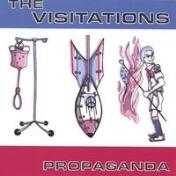 "My fellow Americans, I've come here tonight to report the death of democracy in the United States of America," a familiar voice says at the beginning of The Visitations' Propaganda. Nope, it's not Jello Biafra, it's George W. Bush, his voice edited to, um, highight the subtext of his administration. "There's nothing good on the television," goes the last line on that same song, no doubt echoing the feelings of many of us as we sink further into depression. Davey Wrathgabar and his band The Visitations are as angry about GW Bush and the state of the world as all of us should be - they express that anger clearly and unhesitatingly throughout Propaganda, on songs with names like "Florida," "Burn a Flag," and "Talkin Hate Radio Blues." All of this is preaching to the choir, no doubt, yet it's important for musicians to speak their minds, especially in a time when free speech isn't respected by those in charge. And Propaganda has a humorous tone; if you don't laugh this stuff just gets too painful. What I'm leaving out of this review so far, though, is the music, and that's where Propaganda finds itself tossed aside in a 'maybe I'll find time for this later' pile. The Visitations play a sort of new-wave folk music that sounds awkward and a bit dull - their songs are sort of melodic but not in a very distinct way, and Wrathgabar's voice strikes me as grating. The songs don't stand apart from each other and the album never grabs ahold of my ears. Like all too much protest music, Propaganda doesn't have ths songwriting strength it takes to really get to people's hearts enough to rile them up and stir them into doing something positive, something more than just wallowing in bitterness.
"My fellow Americans, I've come here tonight to report the death of democracy in the United States of America," a familiar voice says at the beginning of The Visitations' Propaganda. Nope, it's not Jello Biafra, it's George W. Bush, his voice edited to, um, highight the subtext of his administration. "There's nothing good on the television," goes the last line on that same song, no doubt echoing the feelings of many of us as we sink further into depression. Davey Wrathgabar and his band The Visitations are as angry about GW Bush and the state of the world as all of us should be - they express that anger clearly and unhesitatingly throughout Propaganda, on songs with names like "Florida," "Burn a Flag," and "Talkin Hate Radio Blues." All of this is preaching to the choir, no doubt, yet it's important for musicians to speak their minds, especially in a time when free speech isn't respected by those in charge. And Propaganda has a humorous tone; if you don't laugh this stuff just gets too painful. What I'm leaving out of this review so far, though, is the music, and that's where Propaganda finds itself tossed aside in a 'maybe I'll find time for this later' pile. The Visitations play a sort of new-wave folk music that sounds awkward and a bit dull - their songs are sort of melodic but not in a very distinct way, and Wrathgabar's voice strikes me as grating. The songs don't stand apart from each other and the album never grabs ahold of my ears. Like all too much protest music, Propaganda doesn't have ths songwriting strength it takes to really get to people's hearts enough to rile them up and stir them into doing something positive, something more than just wallowing in bitterness.
Copyright (c) 2005 erasing clouds |
|